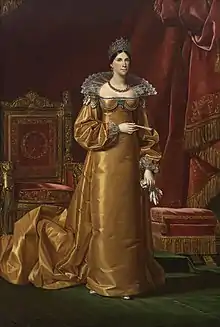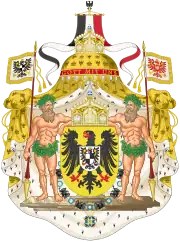Wilhelmine of Prussia, Queen of the Netherlands
Wilhelmine of Prussia (Friederike Luise Wilhelmine; 18 November 1774 – 12 October 1837) was the first Queen consort of the Netherlands as the first wife of King William I of the Netherlands. She had a modest public role but acted as a patron of the arts.
| Wilhelmine of Prussia | |||||
|---|---|---|---|---|---|
 Portrait by Joseph Paelinck | |||||
| Queen consort of the Netherlands Grand Duchess consort of Luxembourg | |||||
| Tenure | 16 March 1815 – 12 October 1837 | ||||
| Born | 18 November 1774 Potsdam, Prussia | ||||
| Died | 12 October 1837 (aged 62) Noordeinde Palace, The Hague, Netherlands | ||||
| Burial | |||||
| Spouse | |||||
| Issue | William II of the Netherlands Prince Frederick Princess Pauline Princess Marianne | ||||
| |||||
| House | Hohenzollern | ||||
| Father | Frederick William II of Prussia | ||||
| Mother | Frederica Louisa of Hesse-Darmstadt | ||||
| Religion | Calvinism | ||||
| Prussian Royalty |
| House of Hohenzollern |
|---|
 |
| Frederick William II |
Biography
Princess Wilhelmine was born in Potsdam. She was the fourth child of eight born to King Frederick William II of Prussia and Queen Frederica Louisa. Her upbringing was dominated by the strict regime of her great-uncle, Frederick the Great, but in general very little is known about her youth. She was given a conventional education for a girl of her time and tutored in needlework and the arts, and described as pretty and sweet.[1]
Marriage
On 1 October 1791, she married her cousin William of the Netherlands, son of Stadtholder William V, Prince of Orange and Princess Wilhelmina of Prussia, in Berlin. The marriage was arranged as a part of an alliance between the House of Orange and Prussia, but it was also, in fact, a love match and became a happy one.[1] The young couple went to live at Noordeinde Palace in The Hague.
In 1795, the French invaded the Dutch Republic, and the princely family went into exile. They first stayed in England, and from 1796 in Berlin. In Berlin, the couple lived with her birth family in royal state in the "Niederländischen Palais" ('Dutch Palace').[1] In 1806, Wilhelmine was again forced to flee from the French army, and settled under difficult economic circumstances in Poland.
Wilhelmine returned to The Hague at the beginning of 1814.
Queen

Wilhelmine became Queen of the Netherlands in 1815. At the time, the Netherlands included the present-day country of Belgium. The court divided their time between the two and divided their winters between The Hague and Brussels, and their summers between Het Loo and Laeken.[1] Wilhelmine personally visited Berlin once a year until her death, where she continued to live in the "Niederländischen Palast" during her visit. She participated in royal representation during her stay in Berlin, as well as attending to her estates in Silesia.[1]
Queen Wilhelmine was modest and stayed in the background, and she did not play any dominant role as queen.[1] She was beloved by her family but was not a popular queen, and was criticized in The Netherlands for isolating the royal family, and later Belgium for her German fashion. Beginning in 1820, her health worsened, and after 1829, she was rarely seen in public, though she continued her trips to Berlin and visiting relatives.[1]
She was interested in painting, attended exhibitions, and helped to protect museums and support artists.[1] She was herself a student of art and regarded as a talented dilettante, ultimately being inducted as an honorary member to the Royal Academy of Fine Arts in Amsterdam.[1] She was a student of Friedrich Bury, financed an Italian study trip for Bonaventura Genelli, and supported the renovation of the royal museum.[1]
She died at Noordeinde Palace in The Hague in 1837, aged 62, and is entombed in the New Church in Delft.
Issue
| Name | Birth | Death | Notes |
|---|---|---|---|
| King William II of the Netherlands | 6 December 1792 | 17 March 1849 | married, 1816, Grand Duchess Anna Pavlovna of Russia; had issue |
| Stillborn son | 18 August 1795 | 18 August 1795 | |
| Prince Frederick of the Netherlands | 28 February 1797 | 8 September 1881 | married, 1825, Princess Louise of Prussia; had issue |
| Princess Pauline of Orange-Nassau | 1 March 1800 | 22 December 1806 | |
| Stillborn son | 30 August 1806 | 30 August 1806 | |
| Princess Marianne of the Netherlands | 9 May 1810 | 29 May 1883 | married, 1830, Prince Albert of Prussia; had issue |
Ancestry
| Ancestors of Wilhelmine of Prussia, Queen of the Netherlands[2] |
|---|
References
- Marjan P. Nekkers-Kapitein, Wilhelmina van Pruisen, in: Digitaal Vrouwenlexicon van Nederland. URL: http://resources.huygens.knaw.nl/vrouwenlexicon/lemmata/data/WilhelminaPruisen [13/01/2014]
- Généalogie ascendante jusqu'au quatrième degré inclusivement de tous les Rois et Princes des maisons souveraines de l'Europe actuellement vivants [Genealogy up to the fourth degree inclusive of all the Kings and Princes of sovereign houses of Europe currently living] (in French). Bordeaux: Frederic Guillaume Birnstiel. 1768., pp. 17 (father's side), 69 (mother's side)
- Wilhelmina van Pruisen (in Dutch)
External links
- Royal House of Prussia at the Wayback Machine (archived November 18, 2006)
- Royal House of the Netherlands and Grand-Ducal House of Luxembourg


